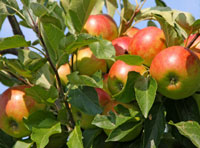Soil & Sea: reports from our producers
This article was originally published in September 2011

Local, organic apples will be late by about two weeks this year. You’ll see them begin to arrive around September 1.
Local, organic nectarines also are late, but with sizeable volumes.
Washington peach producers say their orchards faired pretty well after a late freeze last fall, and a cold, wet spring. The slower growing season helped fruit quality and sizing.
The organic grape crop looks like it’ll be strong in September.
There’s a huge crop of Reed avocados, which are larger with a smoother, lighter green skin than the dark, bumpy Haas variety. Reed avocados are firmer, sweeter and have lower oil content than the Haas, and are excellent in salads, tacos, or sliced on the side. These are plentiful in early fall when the domestic Haas avocado season has ended and South American production hasn’t begun yet.
Local, wild mushrooms could appear early due to abundant summer rain.
Sweet corn and peas from the upper Columbia Basin will be in short supply and inventories low. High prices for other crops, such as field corn and wheat, led farmers to plant more of those crops instead.
Apples, plums, almonds, other nuts and stone fruits are likely to become more costly and difficult to grow because of warmer winter temperatures. A peer-reviewed study in the journal “PLoS One” says the trees need a certain amount of cold weather to blossom and produce maximally.
Honeybee losses seem to have stabilized, according to an annual survey by the U.S. Department of Agriculture and the Apiary Inspectors of America. Entomologists say the numbers are mildly encouraging.
The sustainability of yellowfin tuna from Hawaii has been upgraded. The Monterey Bay Aquarium’s Seafood Watch program says troll- or pole-caught yellowfin now is a “Best Choice” and longline-caught yellowfin now is a “Good Alternative.” Before, they were rated a “Good Alternative” and “Avoid,” respectively.
